From The Blog
-
ConnectWise Slash and Grab Flaw Once Again Shows the Value of Input Validation We talk to Huntress About its Impact
Written by Sean KalinichAlthough the news of the infamous ConnectWise flaw which allowed for the creation of admin accounts is a bit cold, it still is one that…Written on Tuesday, 19 March 2024 12:44 in Security Talk Read 703 times Read more...
-
Social Manipulation as a Service – When the Bots on Twitter get their Check marks
Written by Sean KalinichWhen I started DecryptedTech it was to counter all the crap marketing I saw from component makers. I wanted to prove people with a clean…Written on Monday, 04 March 2024 16:17 in Editorials Read 1582 times Read more...
-
To Release or not to Release a PoC or OST That is the Question
Written by Sean KalinichThere is (and always has been) a debate about the ethics and impact of the release of Proof-of-Concept Exploit for an identified vulnerability and Open-Source…Written on Monday, 26 February 2024 13:05 in Security Talk Read 1114 times Read more...
-
There was an Important Lesson Learned in the LockBit Takedown and it was Not About Threat Groups
Written by Sean KalinichIn what could be called a fantastic move, global law enforcement agencies attacked and took down LockBit’s infrastructure. The day of the event was filled…Written on Thursday, 22 February 2024 12:20 in Security Talk Read 1086 times Read more...
-
NetSPI’s Offensive Security Offering Leverages Subject Matter Experts to Enhance Pen Testing
Written by Sean KalinichBlack Hat 2023 Las Vegas. The term offensive security has always been an interesting one for me. On the surface is brings to mind reaching…Written on Tuesday, 12 September 2023 17:05 in Security Talk Read 2134 times Read more...
-
Black Kite Looks to Offer a Better View of Risk in a Rapidly Changing Threat Landscape
Written by Sean KalinichBlack Hat 2023 – Las Vegas. Risk is an interesting subject and has many different meanings to many different people. For the most part Risk…Written on Tuesday, 12 September 2023 14:56 in Security Talk Read 1858 times Read more...
-
Microsoft Finally Reveals how they Believe a Consumer Signing Key was Stollen
Written by Sean KalinichIn May of 2023 a few sensitive accounts reported to Microsoft that their environments appeared to be compromised. Due to the nature of these accounts,…Written on Thursday, 07 September 2023 14:40 in Security Talk Read 2127 times Read more...
-
Mandiant Releases a Detailed Look at the Campaign Targeting Barracuda Email Security Gateways, I Take a Look at What this all Might Mean
Written by Sean KalinichThe recent attack that leveraged a 0-Day vulnerability to compromise a number of Barracuda Email Security Gateway appliances (physical and virtual, but not cloud) was…Written on Wednesday, 30 August 2023 16:09 in Security Talk Read 2101 times Read more...
-
Threat Groups Return to Targeting Developers in Recent Software Supply Chain Attacks
Written by Sean KalinichThere is a topic of conversation that really needs to be talked about in the open. It is the danger of developer systems (personal and…Written on Wednesday, 30 August 2023 13:29 in Security Talk Read 1894 times Read more...
Recent Comments
- Sean, this is a fantastic review of a beautiful game. I do agree with you… Written by Jacob 2023-05-19 14:17:50 Jedi Survivor – The Quick, Dirty, and Limited Spoilers Review
- Great post. Very interesting read but is the reality we are currently facing. Written by JP 2023-05-03 02:33:53 The Dangers of AI; I Think I Have Seen this Movie Before
- I was wondering if you have tested the microphone audio frequency for the Asus HS-1000W? Written by Maciej 2020-12-18 14:09:33 Asus HS-1000W wireless headset impresses us in the lab
- Thanks for review. I appreciate hearing from a real pro as opposed to the blogger… Written by Keith 2019-06-18 04:22:36 The Red Hydrogen One, Possibly One of the Most “misunderstood” Phones Out
- Have yet to see the real impact but in the consumer segment, ryzen series are… Written by sushant 2018-12-23 10:12:12 AMD’s 11-year journey to relevance gets an epic finish.
Most Read
- Microsoft Fail - Start Button Back in Windows 8.1 But No Start Menu Written on Thursday, 30 May 2013 15:33 in News Be the first to comment! Read 116527 times Read more...
- We take a look at the NETGEAR ProSafe WNDAP360 Dual-Band Wireless Access Point Written on Saturday, 07 April 2012 00:17 in Pro Storage and Networking Be the first to comment! Read 87492 times Read more...
- Synology DS1512+ Five-Bay NAS Performance Review Written on Tuesday, 12 June 2012 20:31 in Pro Storage and Networking Be the first to comment! Read 82036 times Read more...
- Gigabyte G1.Sniper M3 Design And Feature Review Written on Sunday, 19 August 2012 22:35 in Enthusiast Motherboards Be the first to comment! Read 80338 times Read more...
- The Asus P8Z77-M Pro Brings Exceptional Performance and Value to the Lab Written on Monday, 23 April 2012 13:02 in Consumer Motherboards Be the first to comment! Read 70991 times Read more...
Displaying items by tag: Microsoft
Microsoft Launches Bing App for Android and iOS
 Some interesting news on the mobile front this morning; after browsing around the net and looking for something interesting we stumbled across an article on Information Week that was as interesting in it market implications as it is puzzling. The article was an announcement of sorts explaining that the Bing app was now available for iOS and Android, but would not be released for Windows Phone just yet.
Some interesting news on the mobile front this morning; after browsing around the net and looking for something interesting we stumbled across an article on Information Week that was as interesting in it market implications as it is puzzling. The article was an announcement of sorts explaining that the Bing app was now available for iOS and Android, but would not be released for Windows Phone just yet.
Now the thing about this that is puzzling is the need for a “Bing App”. Most people by now will be using a browser that allows you to choose your search engine. If you are looking for Bing then you can select it there and get your fill of Bing on that front. Even Apple’s mobile Safari has Bing as an option now. We have checked and most modern phones will let you change the web search engine from Google (or whoever) to Bing, so on this front the app seems pretty pointless.
On the other hand if Microsoft is trying to replace the default “phone” search engine they are going to have a rough time. We grabbed the Bing App for Android 2.3 (on our EVO 3D) and it would not replace the default Google search feature that pops up when you press the search icon. It also was not able to replace any of the in-app search functions so we are not sure how this App fits in (unless it is just for those die-hard Bing users).
The final thought is that this might help extend the Bing search into the mobile market and in turn bring people over into the Microsoft fold. However, this is very unlikely as a search engine is not going to change your mind about a mobile phone. So what is up with Microsoft sending out the Bing Search App to Android and iOS? We honestly do not know what they are thinking and are making a guess that someone feels it will help them in the long run (obviously or they would not have done it).
As a final thought, you might hear that Microsoft releasing this for Android and iOS shows no confidence in their own Windows Phone Platform. This is simply not an accurate statement; you see Bing is the default phone search and web search on Windows Phone already. Why make an App when it is already there. Like we said, this one is both interesting and odd.
Oh, and one last thing… if you have an Android tablet and were thinking about grabbing this, well you might be a little surprised to find out that it is not available to non-3G Android devices. We attempted on two Android tablets and received the same warning. “This item is not available on your carrier”… Not exactly the way to extend your reach in the mobile market now is it…
Source Information Week
Discuss this in our Forum
ARM Announces 64-Bit Specifications for ARM Processors
 We have been following the path of Windows 8 pretty closely including trying out the Developer’s preview on some existing tablet hardware (which lasted all of 4 days). So far we have a good feel for the OS and what is nice and what is not. We have talked at length about the mistake that we feel the MetroUI is both for the tablet market and the desktop. But it is the tablet market that we are most interested in. We know that there will be more x86 (64) based tablets in the future especially with the popularity (relatively) of the ones that are currently out (and that use a full Intel Core CPU and not an Atom). But how will ARM fare even a quad core ARM SoC when Windows 8 and all of its anticipated bloat hits it?
We have been following the path of Windows 8 pretty closely including trying out the Developer’s preview on some existing tablet hardware (which lasted all of 4 days). So far we have a good feel for the OS and what is nice and what is not. We have talked at length about the mistake that we feel the MetroUI is both for the tablet market and the desktop. But it is the tablet market that we are most interested in. We know that there will be more x86 (64) based tablets in the future especially with the popularity (relatively) of the ones that are currently out (and that use a full Intel Core CPU and not an Atom). But how will ARM fare even a quad core ARM SoC when Windows 8 and all of its anticipated bloat hits it?
This is that thing that has us wondering. Well we think we have an answer as ARM has just announced 64-bit capable processors. The ARMv8 is a going to be a new specification for ARM processors that is capable of executing both 32 and 64-bit instructions. This means an extended memory profile (not to mention performance) for applications that can handle the 64-bit memory block addressing. But more than that these smaller and lighter CPUs will be heading to the enterprise for some specific tasks (which means the rumors about a future ARM based version of Windows Server are true). Imagine being able to utilize these low power lost cost CPUs to run Domain Controllers, Web Server and other system that do not require the heavy lifting of a full x86-64 CPU. It will save companies quite a bit of money, and what is more… what starts in the enterprise ends up on the consumer’s plate. We have a sneaking suspicion that these new CPUs will end up in the consumer market faster than usual though as the press release about this mentioned Microsoft and nVidia directly. nVidia has made no secret that they want their Tegra SoCs to represent 50% of their revenue which means the consumer market for sure (with some enterprise products just for fun).
As of right now, the first devices will not be announced until 2012 with the first prototypes hitting in 2014. This means that while we have a good wait ahead of us it will give Microsoft time to fix what is buggy in Windows 8 just in time for the new 64-bit ARM CPUs to launch.
Discuss in our Forum
Microsoft Selling off Protection, Patent Protection...
 There was a time when IBM was the largest patent holder in the tech world. In fact the joke was that IBM did not have to actually make anything anymore. They could sit back and maintain their profitability with their licensing and royalty fees. Of course this was exaggeration, but IBM did have a massive portfolio and the revenue to back it up. Now, it seems that Microsoft is looking to take IBM’s top spot. They have been busy pressuring and perhaps bullying companies that make Android and Chrome mobile devices to sign agreements with them. The agreements sound a lot like the old Mobster movies. “Hey you pay me 10 (million) dollars a week and we will make sure,… you know, that nothing bad will happen to you.”
There was a time when IBM was the largest patent holder in the tech world. In fact the joke was that IBM did not have to actually make anything anymore. They could sit back and maintain their profitability with their licensing and royalty fees. Of course this was exaggeration, but IBM did have a massive portfolio and the revenue to back it up. Now, it seems that Microsoft is looking to take IBM’s top spot. They have been busy pressuring and perhaps bullying companies that make Android and Chrome mobile devices to sign agreements with them. The agreements sound a lot like the old Mobster movies. “Hey you pay me 10 (million) dollars a week and we will make sure,… you know, that nothing bad will happen to you.”
In short Microsoft is offering protection from patent litigation in return for a small cut of the manufacturing profits from Android and Chrome devices. Now you may think this is all very unethical and you would be right. However, there is no law against this. Just like there is no law against patenting the look and feel of something. To be honest, this is a last ditch effort on the part of Microsoft. They know they are losing the mobile war and that Windows Phone will be a thing of the past in a few short years. Right now they are just trying to replace the income they know they are going to lose with a little extra from someone else’s pocket.
Source Fudzilla
Discuss this in our Forum
Ice Cream Snadwich will help bring Developers to Android
 There has been a lot of talk recently about the vast difference between the number of Android tablets on the market (around 6 million) and the number of iPad devices (about 30 million). There have been multiple excuses, causes and items to blame for this difference, but one that has been overlooked at almost every level is simply time. The original iPad launched in April of 2010 by comparison the first Android tables (of comparable size) did not hit the market until early 2011. Yes there were 7-inch tablets and even some terrible ones running Android 2.0 that were 10-inch but most of these were very short lived. By comparison the first real Android tablets running Honey Comb (Android 3.0) were not launched until around February/ March 2011. This put them in the market at the same time the iPad 2 was being delivered. Now, if you think that this did not impact sales you are seriously deluded. People are always going to go with what they know and trust. At the same time that the iPad 2 was selling out there was also a large number of iPads hitting the second hand markets (eBay, Craig’s List etc.). This only continued the cycle as people were looking to get these devices from former owners. The next thing that Apple did right was to push these to Target and WalMart. That put them in line with the “price conscious” consumer. After all, if you can buy it at WalMart it must be a good deal right?
There has been a lot of talk recently about the vast difference between the number of Android tablets on the market (around 6 million) and the number of iPad devices (about 30 million). There have been multiple excuses, causes and items to blame for this difference, but one that has been overlooked at almost every level is simply time. The original iPad launched in April of 2010 by comparison the first Android tables (of comparable size) did not hit the market until early 2011. Yes there were 7-inch tablets and even some terrible ones running Android 2.0 that were 10-inch but most of these were very short lived. By comparison the first real Android tablets running Honey Comb (Android 3.0) were not launched until around February/ March 2011. This put them in the market at the same time the iPad 2 was being delivered. Now, if you think that this did not impact sales you are seriously deluded. People are always going to go with what they know and trust. At the same time that the iPad 2 was selling out there was also a large number of iPads hitting the second hand markets (eBay, Craig’s List etc.). This only continued the cycle as people were looking to get these devices from former owners. The next thing that Apple did right was to push these to Target and WalMart. That put them in line with the “price conscious” consumer. After all, if you can buy it at WalMart it must be a good deal right?
So with over a year head start, better marketing and a firm foot hold in the consumer’s mind Apple now has a 24 million unit lead on the Android Tablet. But, let’s look at where the Android Tablet is in reality. In only 6.5 months Android Tablets have managed to carve a 6 million unit hole into what was once Apple’s own playground. This is pretty impressive considering Apple claims that Android is inferior and that their OS is fragmented. If you doubt that Apple is concerned about the sudden success of the Android Tablet, just look at the number of lawsuits in progress where Apple is asking for an outright ban instead of monetary compensation. That above all is a big indicator of their mindset.
But what has really gotten Apple so bothered about this? After all it will take years (probably 2-3 just like the iPhone) for the Android tablet to overtake the iPad so why is Apple trying so hard to kill them now? To put things simply, Apple has a problem with iOS. There are two of them that have to be maintained. The iOS for the iPad is not the same as the iOS for the iPhone. For a developer this is a nightmare as they have to write two versions of their app if they want to cover both products. This is a headache to say the least. With Android and their tile based UI there is no reason to write for more than one screen size and this is with Android 2.3 and 3.0. When Ice Cream Sandwich(ICS) hits the market the division will be almost nonexistent. A developer will be able to write one app and not worry about different screen sizes or versions. This will be huge (right up there with Android’s full support of Flash) and could be an item that will lure some developers away from the Apple camp.
Of course this is not an indication that Developers will leave en masse especially with the fear of being locked out of Apple’s walled garden. It is an indication that more developers are likely to work with Android as the ROI (Return on Investment) is going to be much higher than what they will get doing double the work for Apple.
Although the convergence of ICS on the Android Based tablet is a step in the right direction, there is still a lot that Google has to do to grab a larger market share. They have to find a way to wall off certain apps for the average consumer while still allowing the freedom to explore to the more technical. I have talked to more than a few people about this and there are major concerns with owning an Android tablet. Most of these have to do with the type of content and the danger of malware in the Market. Until this can be dealt with it is doubtful that a larger number of people will shift from the safety of Apple’s iTunes garden and enter the jungle that is present in the Market. Google also has to worry about Microsoft entering the ARM based tablet market sometime in late 2012 or early 2013. Personally I think that we will not see a larger adoption of Android tablets until ICS is in full swing. Once that happens and people see what they can have and do versus what they cannot do with the iPad and iPhone things will change.
Discuss in our Forum
Microsoft Trying Another Ploy to Save Windows Phone
 We have talked about this one over and over and over (is my face getting a little blue?). Microsoft just does not get the market they are trying to sell to any more. Don’t get me wrong, I like Windows 7 and their new server stuff is fantastic (we will be covering a lot of that very soon), however when it comes to putting out hardware or even assisting in hardware production they are clueless. This is doubly true for their mobile division. So far we have heard them put down both Apple and Google saying their products are immature and chaotic respectively. Then we heard Andy Lees (the guy in charge of the Windows Phone Division) comment that the iPhone 4S was a wasted opportunity and that talking to a phone was not productive… I think one of the PR guys needs to pull Andy aside and ask him not to talk quite so much.
We have talked about this one over and over and over (is my face getting a little blue?). Microsoft just does not get the market they are trying to sell to any more. Don’t get me wrong, I like Windows 7 and their new server stuff is fantastic (we will be covering a lot of that very soon), however when it comes to putting out hardware or even assisting in hardware production they are clueless. This is doubly true for their mobile division. So far we have heard them put down both Apple and Google saying their products are immature and chaotic respectively. Then we heard Andy Lees (the guy in charge of the Windows Phone Division) comment that the iPhone 4S was a wasted opportunity and that talking to a phone was not productive… I think one of the PR guys needs to pull Andy aside and ask him not to talk quite so much.
Even beyond Andy putting his foot in his mouth on occasion we now have Steve Ballmer telling us what we should want in a phone OS. His last comments on Mango and in turn the MetroUI were almost pleading in their attempt to get the market (and the consumer) to understand that giant square tiles are a good thing. Guys, they are not. We tried them here at DecryptedTech and they just did not work; just like they are not going to work for Microsoft.
Now, Microsoft has run out of ideas and quite possibly time. They are going to attempt to get the manufacturing cost below $200. Oddly enough this announcement came only a day or two after it was discovered that the iPhone 4S had around $188 in hardware inside its housing. While this will make the devices less expensive to make, and in turn should make them cheaper to buy that will not spell success. You have to not only have a compelling product (which they don’t) but also know how to market it (which they do not). On top of all that you have to offer an infrastructure to support it that makes sense and that people want to use (sorry third strike there Microsoft).
Mr. Ballmer, if you do not believe me about cheaper does not win the market; just take a look at Android tablet sales. In many cases they are $100 less expensive and yet the market still keeps buying the iPad… this is despite better hardware too. In the end you have to have two (no three), Ok three things.
1 a compelling product (not great or even that innovative, just compelling)
2 a great marketing team that knows its stuff and can give the product its own image
3 A legal team to fight off the ones over at Apple.
Picture Credit AllThingsD
Discuss in our Forum
Microsoft Dumps a Ton of Money Into a New Marketing Campaign for Windows Phone
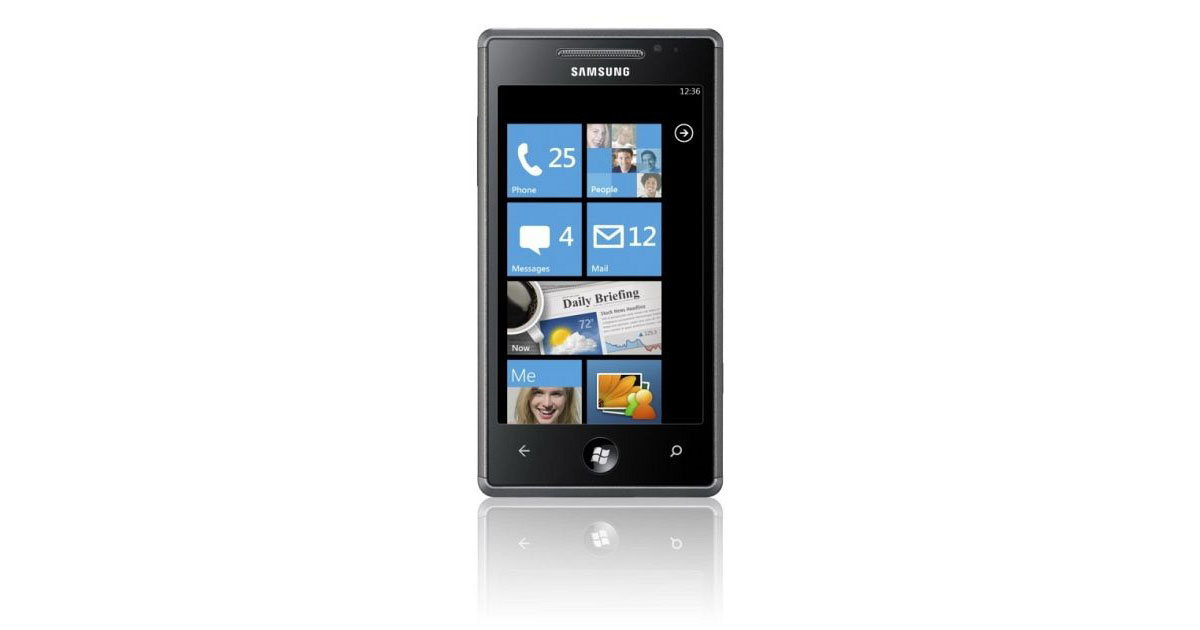 Have you ever loaned someone money and as soon as you gave it to them you thought “well I will never see that back”. I have to wonder if Steve Ballmer is thinking that very thing right now. His company, Microsoft, has just written a very big check to Nokia and a few other EU based phone makers for a huge marketing push on Windows Phone 7.5 (aka Mango). We wonder if this is too little too late. So far Windows Phone 7 has not managed to even capture 2% of the market share. Much of this is due mistakes made in the way Windows Mobile 6.5 was coded. Yes, I am saying that Microsoft started losing market share as far back as Windows Mobile 6.x. From there they had a good chance to build on the relative success of the ZuneHD but failed to read the market queues properly and ended up making two of the worst received mobile phones ever. These were the Kin phones which had a product lifespan of only six weeks.
Have you ever loaned someone money and as soon as you gave it to them you thought “well I will never see that back”. I have to wonder if Steve Ballmer is thinking that very thing right now. His company, Microsoft, has just written a very big check to Nokia and a few other EU based phone makers for a huge marketing push on Windows Phone 7.5 (aka Mango). We wonder if this is too little too late. So far Windows Phone 7 has not managed to even capture 2% of the market share. Much of this is due mistakes made in the way Windows Mobile 6.5 was coded. Yes, I am saying that Microsoft started losing market share as far back as Windows Mobile 6.x. From there they had a good chance to build on the relative success of the ZuneHD but failed to read the market queues properly and ended up making two of the worst received mobile phones ever. These were the Kin phones which had a product lifespan of only six weeks.
After that things began to decline rapidly and Windows Mobile never really took off again. We have talked about some of the reasons for this in recent articles and it really does boil down to Microsoft’s in ability to understand the market and the competition. However, for once they are going to try and do some marketing. We honestly do not feel that any amount of marketing done by Microsoft can save the Windows Phone division (unless they hire the entire Apple PR team. Still we do think they have to try.
The reality is that Microsoft and its partners must change the image of Windows Phone, they have to offer better hardware, faster response and more content than either Apple or Android can, the problem is that Microsoft just does not have the apps to match either of these two companies. In my opinion they do have a much better music service, but you cannot produce a winning phone with just that.
Steve Ballmer will need to keep his check book handy as 2011 runs into 2012 because I have a feeling they will need it just to get on the map for the Holiday Season. To give you an example of what I mean; I asked a few people what they thought of Microsoft’s mobile OS and all I got was a blank look. They did not even know there was such a thing. Like I said, this is going to be an uphill battle and all the trash talking and cash is not going to replace the lack of handsets and market knowledge about the product.
Source Mobile Today
Discuss in our Forum
President of Windows Phone Division talks Smack about iOS and Android
 There are two things you can do when you are at the bottom of the pile. One is to work harder and smarter so that you can fight your way to the top. The other is to talk smack hoping that the people above you will believe you are competent and you can BS your way up a few notches. There are complications with both of these but the latter has more dangers. Unfortunately it is this latter course that the folks over at Microsoft’s Windows Phone division are taking.
There are two things you can do when you are at the bottom of the pile. One is to work harder and smarter so that you can fight your way to the top. The other is to talk smack hoping that the people above you will believe you are competent and you can BS your way up a few notches. There are complications with both of these but the latter has more dangers. Unfortunately it is this latter course that the folks over at Microsoft’s Windows Phone division are taking.
Andy Lees, President of Microsoft’s Windows Phone Division sat down for a quick talk with the people over at the Seattle Times and some of the things he said were interesting, but also a little laughable. He calls Apple’s one million unit selling iPhone 4S a missed opportunity and Android Chaotic. These are some bold words for a company that only captured less than 2% of the market in 2011 so far.
It is true that Apple might have missed an chance at putting out a better product, both hardware and software wise, but the market is speaking and it is saying that they do not care. Over one million iPhone 4S’ have been sold so far. That does not sound like consumer disappointment no matter how much you dislike Apple. As for Android’s chaotic development, well one of the things that people like about Android is that they can get the version they like. I personally like the SenseUI version of Android that HTC uses and prefer it over the stock version and the same can be said for many Android owners.
No, the comments sound more like someone grasping at straws and asking you to ignore the obvious. This leads us into the next comment Lees called the Mango UI a “flowing, almost singular experience” however others have called it the Jitterbug of touch screens. The tile layout is eye watering and almost obnoxious. The fact that Microsoft is forcing this on the Xbox 360 and Windows 8 is quite annoying. Having tinkered around with a Windows Phone recently I can tell you that there was nothing flowing or singular about the experience and after a week fighting Windows 8 and the MetroUI I could not imagine having to deal with that on a daily basis. I think that the developers at Microsoft do have a good concept and vision, but they are still falling short of what the Market wants. The tile based UI is not it, they like icons and widgets that they can drag around and manipulate. You would think that Microsoft would have learned this by now and maybe tried to find a way to make their UI more fluid because a bunch of square tiles is anything but fluid.
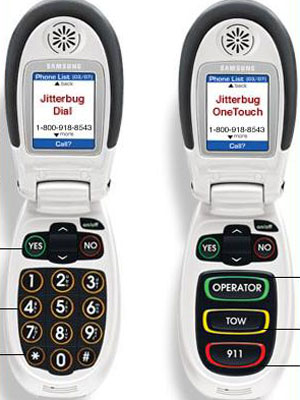
I think that all we are seeing is a PR push from Microsoft hoping that this gets pushed around enough to generate interest. So far, there really has not been any in Windows Phone, and the disappointment in the developer’s release of Windows 8 has probably caused some concern as the Metro UI with its large and ungainly tiles is the way Microsoft wants to go; now they are just hoping they can convince us that is what we want too…
Source Seattle Times
Discuss in our Forum
Consumers want a Windows Based Tablet
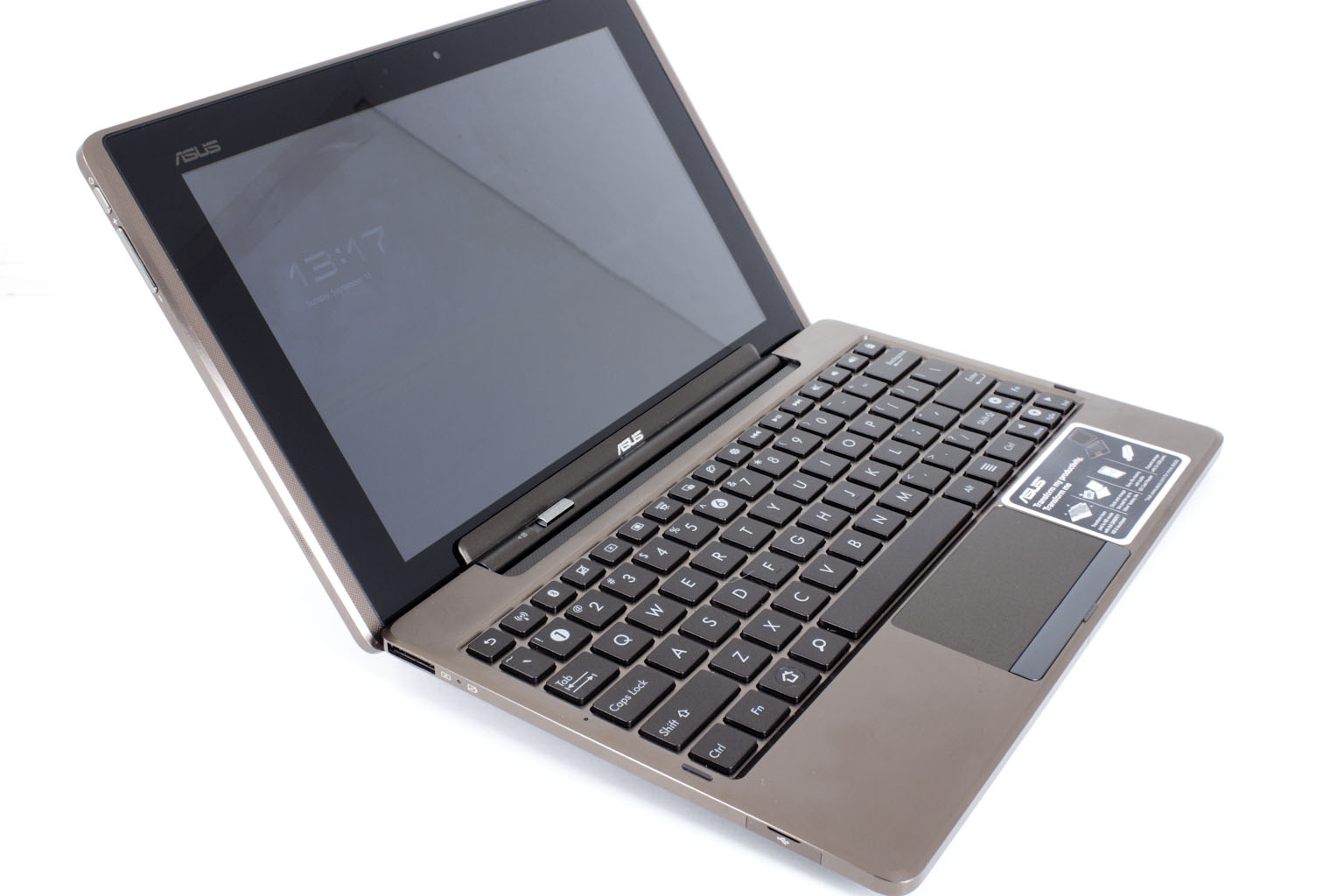 Remember how we told you not too long ago that Microsoft was being smart by working on a tablet friendly version of Windows 8? (Which they have been trying very hard to screw up) Well, one of the things we said about this was the people want a tablet that can do real production work. We have seen this in our own tinkering with multiple tablets from the iPad, iPad2, Transformer and the Flagship tablet, the Asus EEE Slate EP 121. Out of all of these, the only one that we can actually do full production work on is the EP121. Oddly enough (not really) it is also the only one of the group that runs on Windows 7.
Remember how we told you not too long ago that Microsoft was being smart by working on a tablet friendly version of Windows 8? (Which they have been trying very hard to screw up) Well, one of the things we said about this was the people want a tablet that can do real production work. We have seen this in our own tinkering with multiple tablets from the iPad, iPad2, Transformer and the Flagship tablet, the Asus EEE Slate EP 121. Out of all of these, the only one that we can actually do full production work on is the EP121. Oddly enough (not really) it is also the only one of the group that runs on Windows 7.
Don’t get me wrong; I love the Transformer (we will have a review of that up soon) for its versatility and ease of use. It is a great little tool and easy to transport. However, there are no real productivity apps available for it. I have tried all of the office suites from Documents to Go, Apple’s Pages, to Quick Office. None of them can compete with Office 2010; even Pages (which comes closest) cannot cut it. The tools and flow are not there, it is as simple as that.
It seems that this is not just my opinion on the subject, but a majority of consumers in both the US and China. According to a poll taken by the Boston Consulting Group and another one by Forrester earlier this year over 40 % of US consumers would like a Windows Based Tablet. BCG’s numbers came in at 42% while the Forrester report showed a nice 46% wanted a Windows based tablet. The remaining 50%+ was not all iOS either. Forrester claimed that 9% were interested in Android while 16% wanted iOS. BCG’s study claimed that 20% were interested in Android while 27% were looking into an iOS based tablet.
These numbers are only shocking when you leave out what people really want from their devices. They want a seamless experience. One thing that bugs me about having a desktop, laptop, and two different tablets is that to do anything on the Transformer I have to format it differently (especially videos). On the other Windows based devices, I just move files back and forth or put them in my Asus Cloud Drive account (if they are not important or need security). Of course it also does not mean they want something like the EP121. While I love my EEE Slate, it can be bulky and is awkward to use with the keyboard at times. No what they want is something like the Tab or the Transformer, but running all of their favorite Windows software (including Office); this is what will finally bring the tablet home for many people.
So it seems that I am not the only one that feels that Windows is making the right (if somewhat late) move to a more tablet based OS and will only increase their potential for profit by coding for ARM (something they should have done with Windows 7). Of course… that is saying they do not alienate all of their potential customers by failing to grasp what the market really wants in a tablet.
Source All things D
Discuss in our Forum
Microsoft is at it Again
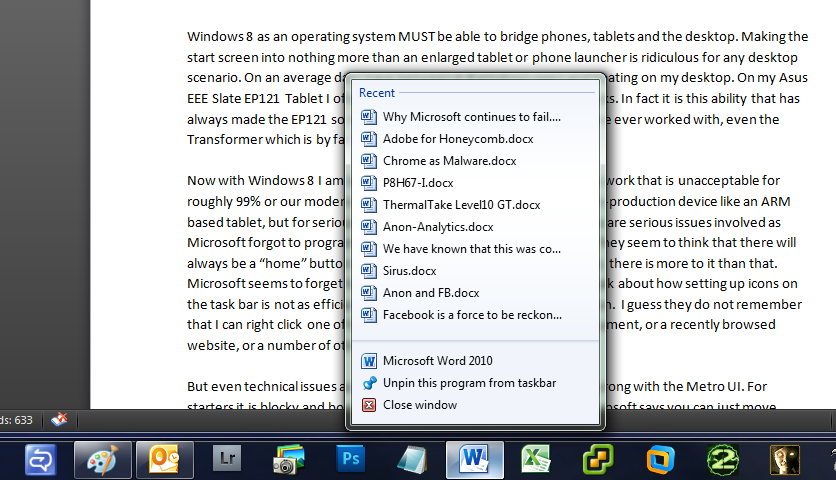 Microsoft is at it again it seems. Sometimes I do not know what goes on in some of their meetings. After hearing the many complaints about the new Metro UI (also known as the Start Screen) Microsoft is choosing to defend it instead of working to make it a more workable product for everyone. This is from the latest Building Windows 8 Blog where we are treated to comments like “But, when you’re launching a new app, you’re leaving the thing you’re currently doing. So we wanted to take advantage of the whole screen to make launching and switching apps as efficient as possible” that are intended to make the MetroUI acceptable. The logic here is that you only want to use on Application at a time. This though process is not only ludicrous it shows an incredible lack of vision.
Microsoft is at it again it seems. Sometimes I do not know what goes on in some of their meetings. After hearing the many complaints about the new Metro UI (also known as the Start Screen) Microsoft is choosing to defend it instead of working to make it a more workable product for everyone. This is from the latest Building Windows 8 Blog where we are treated to comments like “But, when you’re launching a new app, you’re leaving the thing you’re currently doing. So we wanted to take advantage of the whole screen to make launching and switching apps as efficient as possible” that are intended to make the MetroUI acceptable. The logic here is that you only want to use on Application at a time. This though process is not only ludicrous it shows an incredible lack of vision.
Windows 8 as an operating system MUST be able to bridge phones, tablets and the desktop. Making the start screen into nothing more than an enlarged tablet or phone launcher is ridiculous for any desktop scenario. On an average day I have between 6-8 windows open and floating on my desktop. On my Asus EEE Slate EP121 Tablet I often have 2-3 open just to do my normal tasks. In fact it is this ability that has always made the EP121 so much more attractive than any tablet I have ever worked with, even the Transformer which is by far my favorite non-Windows system. 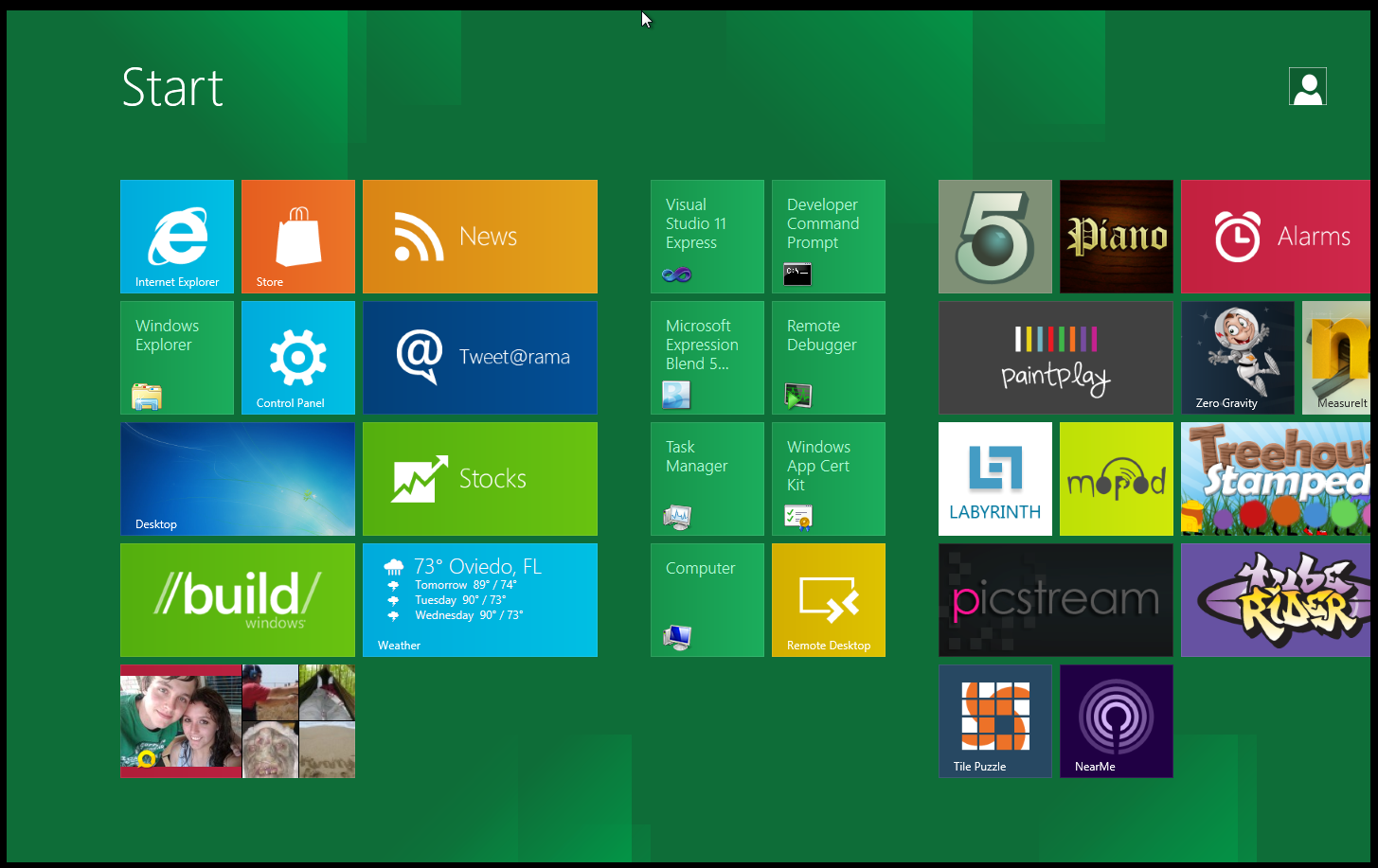
Now with Windows 8 I am being forced to work inside the very frame work that is unacceptable for roughly 99% or our modern productivity work. Sure it is nice for a non-production device like an ARM based tablet, but for serious work it is a joke. Even on the tablet there are serious issues involved as Microsoft forgot to program little things like a back option in the UI. They seem to think that there will always be a “home” button to take you back when needed. However, there is more to it than that. Microsoft seems to forget how Windows 7 works. In their blog they talk about how setting up icons on the task bar is not as efficient as large square icons all over your screen. I guess they do not remember that I can right click one of those and with ease open up a recent document, or a recently browsed website, or a number of other things. 
But even technical issues aside there is still quite a few other things wrong with the Metro UI. For starters it is blocky and boring and a pain in the ass to customize. Microsoft says you can just move things around; we tried it and unless we followed a certain pattern every time we had one of the larger rectangular “live links” we were stuck with gaps in the flow of the screen. We also had to be conscious of where we tried to put these links, they would not just arrange on the screen like with Android or iOS, they wanted to clump together. Personally I like the idea of standard icons and my choice of widgets that provide me with the information I want to see. Not a predetermined set of blocks that I cannot customize or adjust to suit my needs.
Microsoft, you are doing it again and you really need to pay attention. The Windows Phone UI is not popular; it is not a major selling point of Windows Phone so you really need to stop trying to force it on desktop users, if you do not (or at least allow it to be turned on and off) you will have another Vista on your hands which is something you really do not want at this time.
Discuss in our Forum
Why Microsoft continues to fail
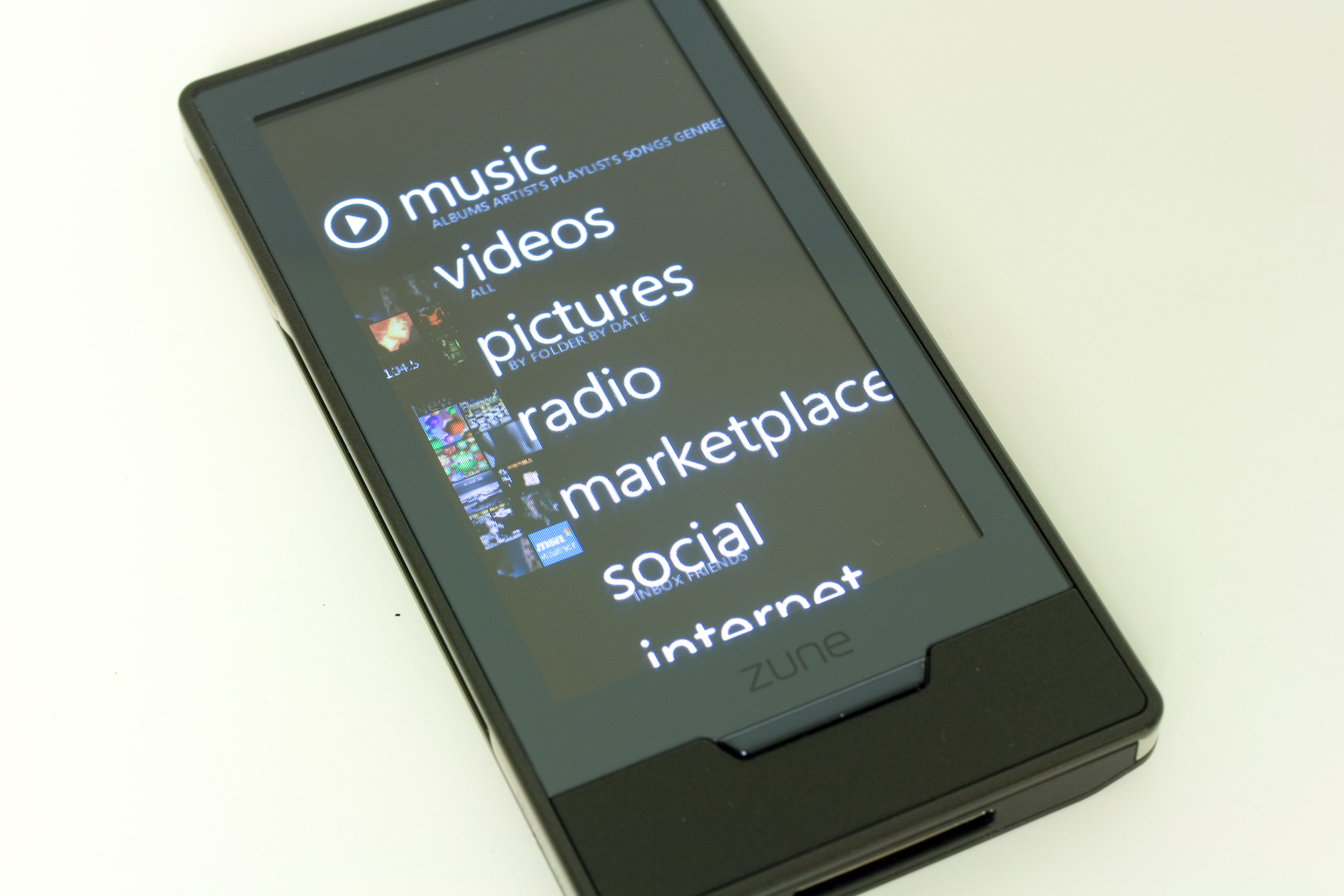 One of the things that continues to annoy me about Microsoft is their constant failures. These failures are not due to product failures. The products they make are pretty solid; no it is because Microsoft fails to understand the market they are competing in. In the Operating system market Microsoft truly only has one competitor. I know I am annoying the Linux guys when I say this but Apple is their only real competition when it comes to the desktop OS. The same thing can be said for their Productivity suite Office. Even Mac owners use Office for Mac. Again I know there are multiple open source office products but even the most popular of them cannot compete with Microsoft sales in this area.
One of the things that continues to annoy me about Microsoft is their constant failures. These failures are not due to product failures. The products they make are pretty solid; no it is because Microsoft fails to understand the market they are competing in. In the Operating system market Microsoft truly only has one competitor. I know I am annoying the Linux guys when I say this but Apple is their only real competition when it comes to the desktop OS. The same thing can be said for their Productivity suite Office. Even Mac owners use Office for Mac. Again I know there are multiple open source office products but even the most popular of them cannot compete with Microsoft sales in this area.
